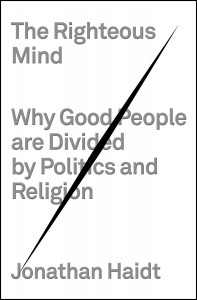From the Freakonomics blog:
“Morality, by its very nature, makes it hard to study morality,” writes the social psychologist Jonathan Haidt. “It binds people together into teams that seek victory, not truth. It closes hearts and minds to opponents even as it makes cooperation and decency possible within groups.”
His new book is called The Righteous Mind: Why Good People Are Divided by Politics and Religionand it is absorbing on so many levels.
Visit the originan post, as Haidt answers questions from readers.
I stumbled across this today, and wondered: "Why, in Delaware, where there are so many people concerned with public education that we actually have a statewide debate going on, do we refuse to credit that people on the other side of the question are good people with different ideas, instead of being bad people with different ideas?"
Why do we always attribute the opinions with which we disagree to venality, greed, malfeasance, and lack of compassion?
I've done it; so have you.
Next Tuesday, many of us (I hope many of us) will go to the polls and vote in school board elections. I have my candidate; some of you who stop here support a different candidate, or will vote in a different district election.
I get the sense that much of this election comes down to voting against someone or something: a PAC, a union, a charter school.
On Tuesday, if you vote, I'd like you to try to make up your mind to vote for something.
Vote for what you honestly think will be best for the kids in your district.
If you do that, I'm ok with however you cast your ballot.
And then, once a candidate has been elected, don't sit back and wait for them to fix the problem.
Whether your candidate won or not--help them.


Comments